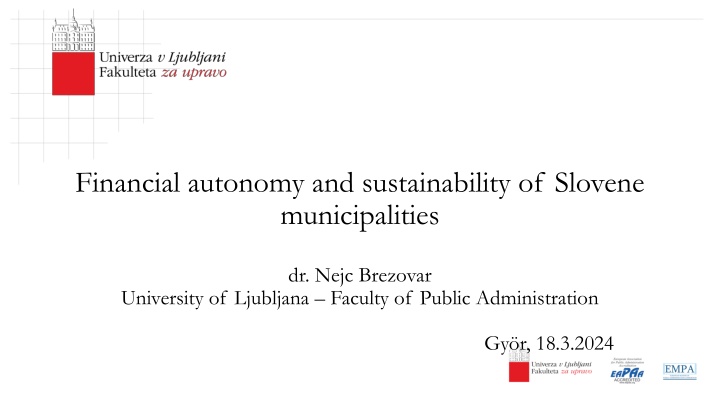
Financial Autonomy and Sustainability of Slovene Municipalities
Explore the financial autonomy and sustainability of Slovene municipalities, focusing on funding sources, principles of local self-government, and allocation of resources. Learn about the constitutional provisions, financing mechanisms, average costs, and appropriate expenditure involved in managing municipal tasks effectively.
Uploaded on | 0 Views
Download Presentation

Please find below an Image/Link to download the presentation.
The content on the website is provided AS IS for your information and personal use only. It may not be sold, licensed, or shared on other websites without obtaining consent from the author. If you encounter any issues during the download, it is possible that the publisher has removed the file from their server.
You are allowed to download the files provided on this website for personal or commercial use, subject to the condition that they are used lawfully. All files are the property of their respective owners.
The content on the website is provided AS IS for your information and personal use only. It may not be sold, licensed, or shared on other websites without obtaining consent from the author.
E N D
Presentation Transcript
Financial autonomy and sustainability of Slovene municipalities dr. Nejc Brezovar University of Ljubljana Faculty of Public Administration Gy r, 18.3.2024
Some facts * More on https://www.slovenia.info
Article 146 Constitution (funding of the state and local communities) The state and local communities obtain funds for the implementation of their tasks through taxes and other mandatory duties and through income from their own property. The state and local communities show the value of their assets with asset balance sheets. Article 147 Constitution (taxes) The state prescribes taxes, customs duties, and other duties by law. Local communities prescribe taxes and other duties under the conditions set by the constitution and the law.
Financing of municipalities Financing of municipalities is based on the principles of local self-government, especially the principle of proportionality of funding sources with the tasks of municipalities and the principle of autonomy of municipalities in financing municipal tasks. The sources of financing of the municipality are revenues from the municipal budget from: personal income tax (PIT - 54%) real estate tax (NUSZ); tax on water vessels; real estate transaction tax; inheritance and gift tax; tax on winnings from classic games of chance (lottery) and other tax, if so determined by the law governing the tax. - - - - - - - - Other own resources : Revenues from self-contributions, fees, fines, concession fees, payments for services of local public services and others are also a source of financing for the municipality, if so determined by the law governing the individual tax or by a regulation issued on the basis of the law.
Average costs and appropriate expenditure Tasks, the costs of which are taken into account to determine the appropriate spending of the municipality, are tasks that the municipality must perform based on laws and to the extent determined by laws, and refer to provision of public services and implementation of public programs in the areas of: - preschool education, - elementary education and sports, - primary health care, - social security, - cultures etc. Average costs for financing municipal tasks are calculated as average costs per inhabitant for the next two fiscal years negotiations, state budget and legislative veto! The appropriate expenditure of the municipality for an individual budget year is determined by the ministry responsible for finance, according to the equation: PPi = (0.61 + 0.13*Ci + 0.06*Pi + 0.12*PMi + 0.04* Mi + 0.015*SUi + 0.025*SDi)*P*Oi
Classification of financial autonomy of municipalities in Slovenia *U. Pinteri (2014)
Participatory budget a tool for sustainable development? Article 48.a (Local Self-Government Act) In the process of preparing the budget proposal, the municipality can determine the amount of funds intended to finance projects proposed by citizens. The municipality shall hold consultations with citizens on the proposed projects no later than before submitting the budget to the municipal council for acceptance. Soft approach A facultative tool Inclusive, people centered projects promoting facilities for socializing, and different kinds of public infrastructure capacities in line with the municipal social sustainability agenda promoting equality and diversity, social cohesion, democracy and governance, and quality of life in a certain municipality.
Thank you for your attention! nejc.brezovar@fu.uni-lj.si
